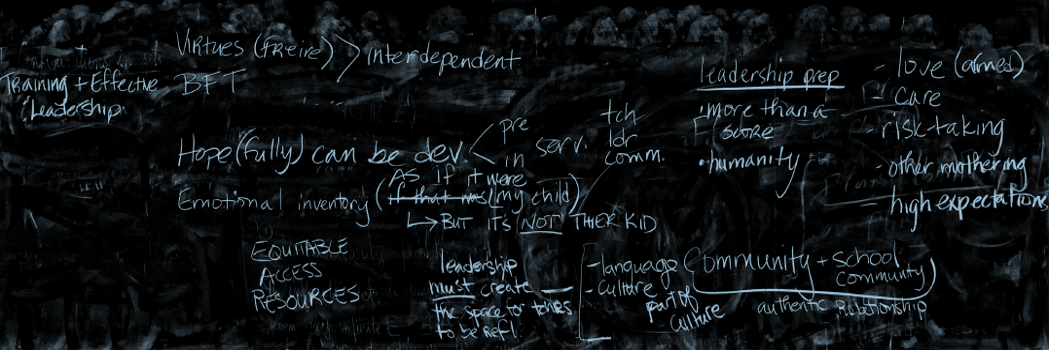In reading about the principal highlighted in this week’s readings, I was amazed by the level and care and dedication that he exhibited. The ease with which he interacts with both the teachers and the students makes it feel like his school is the ideal place to learn and a perfect community to contribute to. I was so moved by the call to action and invitation that he wrote to NYC leaders and educators following the release of Eric Garner that I read the section aloud to my colleagues.
I also appreciated that Rosa included that the DOE “rejected a proposal to include student, parent and teacher participants in the study,” and that she used the NYCDOE School Survey data to “mitigate the limitation …” This transparency was really helpful and meaningful for me. I have been thinking a lot about ways to include parent and teacher voice into the structure of the school. Though there are more authentic ways than these surveys that are published on school websites, it is interesting to see the different ways that community voices are honored.
Lastly, I just wanted to say how wonderful it is to look at positive counternarratives in this class. I especially appreciate that Rosa wrote, “As a critical ethnographer (Madison, 2020), I am drawn to counternarratives of success to better understand the underlying qualities and characteristics of effective principals leading in urban schools, and to do so in a way that honors the individuals who have opened their leadership practice to scrutiny.” Though many researchers assume that giving a platform to marginalized voices is always positive, I think that as researchers we have to be very careful at the frameworks that we use to interpret the communities that we enter into. As Foucault said that “visibility is a trap.” We have to recognize that putting people in the spotlight can be very dangerous. As such, I appreciate that Rosa is looking for positive counterstories to highlight and learn from the good being done. I also found it interesting that Rosa highlighted the ways that she served the community. I believe that it is important for researchers to not only give back to the places that they study, but that they write about it so that it becomes a regular practice.




Hi Kushya!
I enjoyed reading your post this week 🙂 I agree re: your perspective on how we share counternarratives… so much of the dialog around urban schools tends to focus on what they are lacking – ie the disparities that exist and the problems that persist like teacher turnover, school to prison pipeline… while exposing these problems is important, I think that by ONLY exposing problems, we reinforce the idea of a lack… I love Yosso’s concept of “cultural wealth” and Rosa’s paper made me think a lot about that — sharing the assets and successes of the communities we serve and not focusing or harping only on deficits is powerful… and also can help fuel hope!